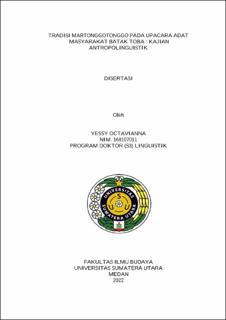Tradisi Martonggotonggo pada Upacara Adat Masyarakat Batak Toba : Kajian Antropolinguistik

Date
2022Author
Octavianna, Yessy
Advisor(s)
Sibarani, Robert
Situmorang, Hamzon
Hasibuan, Namsyah Hot
Metadata
Show full item recordAbstract
Martonggotonggo is a prayer tradition that contains requests, praises, blessings, and advice carried out by the Toba Batak people at marriage and death ceremonies. To analyze the martonggotonggo tradition, an anthropolinguistic approach is used which is an interdisciplinary approach between language and speech that focuses on performance, indexicality, and participation. This study uses a phenomenological paradigm with the qualitative research because language and speech in performance of martonggotonggo as the realm of this study is a social phenomenon. This study seeks to explore, discover, reveal and explain the lingual and nonlingual performance patterns of the martonggotonggo tradition, the meaning of performative utterances uttered by partonggotonggo 'ceremonial leader', The research method used is the ethnographic model method proposed by Spradley by applying 12 interview steps and 12 observation steps. The type of data used in this study consisted of primary data and secondary data. Primary data sources are recordings of martonggotonggo's performance, field notes, observations, and interviews. Secondary data sources in the form of written documents or library documents from books or literature on tonggotonggo. The findings of performance patterns are in the form of language practice which includes structures, formulas, martonggotonggo rules. The findings of performative utterances are categorized as behavioral pragmatic, excessive, and commissive. Findings on lingual and nonlingual indexicality explain the meanings, functions, values, and norms to find local wisdom contained in the martonggotoggo tradition. The results showed that the lingual performance pattern of the tonggotonggo text consisted of opening, body and closing. The opening section consists of proverbs, greetings, greetings, transitional speeches, calling sentences, complimenting sentences, and declarative sentences. The body consists of a request sentence consisting of two types of petition sentence, namely a blessing-begging sentence and a permission-begging sentence. The closing section consists of greeting-blessing sentences and closing sentences. In martonggotonggo performative speech, the exercitives pragmatic category dominates more than the behavitives and commissive pragmatic categories. This shows that the performative speech of martonggotonggo contains the intent of praying, advising, pleading, praising, thanking, being generous, and blessing. The martonggotonggo tradition includes meaning, function, values, and norms. The meaning of martonggotonggo is to beg or ask, so that the function of the martonggotonggo tradition is to convey requests, offerings, blessings, advice, and local knowledge that contain values and norms that rely on religion and customs that are believed by the Toba Batak people. Local wisdom in the martonggotonggo tradition is in the form of values and norms that are embodied in the form of local wisdom. The local wisdom includes 1) politeness, 2) welfare and prosperity, 3) harmony, 4) mutual cooperation, 5) honesty and commitment, 6) peace, 7) gratitude. Local wisdom in the martonggotonggo tradition is in the form of values and norms that are embodied in the form of local wisdom. The local wisdom includes 1) politeness, 2) welfare and prosperity, 3) harmony, 4) mutual cooperation, 5) honesty and commitment, 6) peace, 7) gratitude. Local wisdom in the martonggotonggo tradition is in the form of values and norms that are embodied in the form of local wisdom. The local wisdom includes 1) politeness, 2) welfare and prosperity, 3) harmony, 4) mutual cooperation, 5) honesty and commitment, 6) peace, 7) gratitude.
